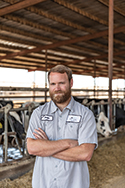 |
|||

|
 |

|
|

Millennials discuss workplace diversity, social media presence
Editor’s note: “Mind of a Millennial” is CMN’s segment tapping into the unique perspectives of dairy industry professionals of the millennial generation. As this segment of the population takes on increasing leadership roles at companies across the industry, we delve into the challenges millennials face in today’s fast-paced workforce, from communication to management style to work/life balance.
MADISON, Wis. — As employees across generations begin to return to traditional office settings, what lessons from the virtual working atmosphere many experienced during the pandemic will they bring with them?
In our latest round of Mind of a Millennial, dairy industry professionals from this generation discuss the pros and cons of virtual versus in-person connection and what the typical work environment might look like moving forward.
Participants also discuss how a multigenerational workforce can bring an array of experience and perspectives to a company, as well as the importance of internet savvy and a professional social media presence in today’s employment landscape.
This round’s participants are:
• Brian Fiscalini, CEO, Fiscalini Farmstead Cheese Co., Modesto, California
• Lucas Fuess, director of Dairy Market Intelligence, HighGround Dairy, Chicago
• Nick Managan, Northeast marketing manager, Cabot Creamery Cooperative, Waitsfield, Vermont
• Michelle Purvis, senior vice president, human resources, Dairy Management Inc., Rosemont, Illinois
• Dustin Winston, commodity analyst, StoneX Financial Inc., Chicago
1. Several generations compose today’s workforce — millennials, Gen X, Gen Z, baby boomers and sometimes, “the silent generation.” How do you think companies can benefit from a multigenerational workforce?
 |
Brian Fiscalini |
Fiscalini: People are the best part of our business. We are blessed to have dedicated people that embrace our family atmosphere. The current variety of generations creates a unique work environment that I do not believe is much different from previous generations. The people with the most experience in our business help teach and motivate the newer people. We are constantly hearing that millennials are lazy and baby boomers are grumpy workhorses. I think the culture of business is what helps erase those stereotypes. We show up to work to accomplish the same goal, and every person contributes in their own way and is satisfied by different forms of recognition.
Fuess: I think diversity in its multiple forms drives strength within companies, with multigenerational teams able to benefit from diverse and unique perspectives from people with varying tenure. While experience is often critically important for team functioning, it is also possible that new, fresh perspective can drive efficiencies or improve operations. Teams that are comfortable interacting with people different from each other in times of both success and conflict can drive better results.
Managan: Diversity is enormously beneficial to a company when properly utilized. Different perspectives and innovate thinking help us fully meet the needs of our customers.
At Cabot, we are very fortunate to have serious longevity. We have farm families that have been in the cooperative for generations. Nearly 50% of our workforce has been with the company for more than 10 years, and 20% more than 20 years. Longevity helps keep our culture strong and stable, and it is just as important to be constantly innovating and striving to meet the needs of all our customers — and future customers. We all benefit from having an open mind, and for all teammates to bring their perspective and ideas to help the farm families in our cooperative thrive.
 |
Michelle PurvisDairy Management Inc. |
Purvis: A multigenerational workforce is critical to a company’s success because it enables diversity of thought, including new/fresh thinking and institutional knowledge. History can inform new projects just as much as younger generations can help enrich them with new perspectives. Reverse mentoring can also play a valuable role, which is particularly essential to the dairy industry and keeping our work relevant with consumers. Overall, multigenerational workforces help to challenge everyone across all generations and allows us to balance contemporary thinking with wisdom and time-tested techniques.
Winston: I have been told by many mentors, “If you aren’t moving forward, you’re falling behind.” I think that this applies to business as much as it does personal growth. Having multiple generations allows for a meshing of ideas, and if nurtured, the best opportunity for a business to move forward.
2. As businesses begin to open up and resume full in-person operations, how do you see the workplace returning to normal, and what kind of changes do you anticipate in the post-pandemic era?
Fiscalini: Honestly, we have been very fortunate to live in a rural community and work in a business that provides food. We are one of the most essential businesses, and the pandemic did not have the same impact on our business as it did for many others. Our cows need to be fed and cared for every single day, so we never had the option to work from home. Making cheese is also something that we cannot do remotely. I know that many people are excited to see friends and relatives. I think people want to be social again, and I am happy for that.
 |
Lucas Fuess |
Fuess: I don’t believe that workplaces need to return to what was considered “normal” before March 2020.
While challenging in myriad ways, I hope businesses can also celebrate the notable accomplishments that teams and businesses achieved throughout the past year-and-a-half. Whether it be virtual visits that save on travel costs when necessary, or proven competence of employees spending some amount of time working from home, I think that businesses will ultimately settle on a more flexible and hybrid form of functioning. While in-person events — ranging from internal strategic conversations within companies to externally building business with clients over dinner — are critically important, I think there is a future possible that doesn’t necessarily involve employees living in the same location or tolerating a stressful daily commute.
Managan: The past year has brought enormous change. Like many companies, we adjusted so administrative employees could work from home and saw little effect on the quality of work. That may lead to more flexibility for our administrative workforce moving forward.
With more people comfortable video conferencing, we have new opportunities. We can better connect with distant partners and customers. We can share farm tours and cooking demonstrations with people anywhere in the world.
At the same time, the appreciation for in-person activities and real human connection has never been higher for many people. We also have many positions within our operations that are unable to work remotely, so companies will need to balance their efforts and policies, and work to create equity.
Purvis: Many companies are trying to figure out the hybrid workplace in the post-pandemic era. I think that will become the new normal, and the employers who do it successfully will dig into the details and determine what works best for them, their staff and their business — not necessarily by trying to replicate what other companies and resources suggest.
As we navigate the upcoming changes, companies will have to put more trust in their employees, give more autonomy to their employees and understand that offering more flexibility can be a positive change. Equally important, companies will also have to be up front with employees about times when it’s important to be in the office, even if it’s for the greater good (e.g., the onboarding of a new team member, a brainstorming meeting, etc.). Overall, open dialogue and communication will be essential, and I think the biggest change we can anticipate as an outcome of all of this is more trust-building between employers and employees.
 |
Dustin Winston |
Winston: I don’t think that it is that big of a stretch to think that the pandemic will have a lasting impact on the way in which companies conduct business. I expect there will be some remnants of our work-from-home era for the businesses that found it possible to still conduct their day-to-day operations.
3. What are your opinions on the need to maintain a professional social media presence? Has your social media activity ever impacted a job? When hiring, do you typically check out candidates’ social media profiles?
Fiscalini: I may be a bit of a unicorn as a 36-year-old that only has LinkedIn. I really do not like social media. I do not look people up before interviewing them and try not to let anyone’s previous life impact my decision on who they are today. I have a creepy dream that all social media be shut down for 48 hours and people must go back to taking a walk or looking someone in the eyes when talking to them.
Fuess: In an era where almost anything can be discovered with a quick internet search, I think employees should be cognizant and cautious of the content posted online. There are quick and functional solutions to privacy matters on most social media platforms that should be taken advantage of for a number of reasons in addition to professionality. However, with the integral nature that social platforms play in our lives, it’s not all negative — employees can maintain a professional social media presence that can be beneficial to the nature of their work!
 |
Nick Managan |
Managan: Working on the Cabot Creamery brand team, social media is critical for connecting with people interested in learning more about our products and the farm families in our cooperative. It’s critical to be able to maintain those connections.
Likewise, if an individual is comfortable with social media, it can be a great way to connect with friends, family AND professional contacts. I have connected with many colleagues and partners through social media, and it is helpful in identifying common interests, shared values and ways to work together.
Purvis: I strongly recommend maintaining a professional social media presence, particularly on LinkedIn. It’s an opportunity for you to authentically demonstrate your professional brand and tell the story of your educational background and experience — all in a digestible snapshot on a widely-used tool/database. Not only is it likely viewed during recruiting activities, but it’s also valuable for networking and quick professional connections.
(Regarding social media activity impacting a job), the quick answer here is — I wouldn’t know. But the relevant answer is — it could. Right or wrong, my social media presence can be viewed as a reflection of my judgement, and whether I care about that potentially affecting a job prospect is up to me. For example, I tend to avoid putting polarizing content on my social media, but others may be proud to do so based on their beliefs.
We do not make hiring decisions based on candidates’ social media profiles. Hiring decisions are made based on our assessment of the candidate’s ability to perform the job through the screening and interview process. However, we do typically review candidates’ LinkedIn profiles to check out their activity and/or recommendations from other users. On occasion, we may review other social media platforms, but only on an as-needed basis.
Winston: I think professional social media is very important, and my social media has never impacted my ability to get a job. I do not know if the two are correlated, but I do believe that you can have a professional social media while still maintaining your personal identity. I have never felt the need to check social media profiles.
4. With an increasingly digitized marketplace, how much importance do you place on a potential employee’s familiarity with social media or website navigation?
Fiscalini: I think the ability to use and embrace technology is very important in today’s marketplace. The use of social media and website navigation are not extremely important to me for potential employees. I try to attract people who love what we do and can help us do it better. People who are motivated and engaged will learn the skills that are needed for any job. We must keep the job challenging and listen to our people. They will give us the best feedback.
Fuess: Social media and website navigation are basic skills that are necessary in today’s world. It seems like a basic assumption that employees would be able to navigate digital channels if it is at all relevant to their position.
Managan: The importance of digital savvy depends on the role, but it would be challenging for anyone in marketing, sales or communications to not have those abilities. Additionally, those skills can be an advantage in any role. We have many team members and farmers throughout the cooperative who add incredible value by sharing their perspectives in our farmer Facebook group or through social media platforms.
Purvis: For marketing and communications roles, familiarity with social media is critical. For all roles, website navigation is considered foundational. A candidate’s ability to be self-sufficient and seek out information proactively (on the web and elsewhere!) is a highly attractive skill that is probably not probed much in interviews but would be a great one for the candidate to highlight.
Winston: I think it is natural to assume and expect a certain level of familiarity with the internet these days. It bugs me when companies don’t have a professional, easy-to-use webpage these days.
5. What are some of the workplace trends in 2021 that companies can embrace to attract and retain more talent from younger generations?
Fiscalini: The younger generation of people want to feel safe and included at work. We must make it a point to interact with them on a regular basis. They want to be seen, heard and recognized. I have found that when we describe what success looks like and let people get there in their own way, it works better. Imagine a race when you cannot see the track or the obstacles but you can see the finish line. Everyone may take a different route but we all end up at the same point.
Fuess: It seems that younger generations have placed a much greater emphasis on quality of personal life than was typically seen in the past. Benefits like additional vacation time or flexible work locations or hours are increasingly necessary to attract younger talent; company culture and a sense of purpose are also valuable.
However, it’s not all about fancy perks — I would bet all generations would agree that a competitive salary will always be a primary consideration.
Managan: The past year accelerated a growing trend of employees seeking purpose in their work. An increasing number of Cabot’s recent hires found us because we are a cooperative owned by hundreds of farm families, and a Certified B Corp committed to using business as a force for good. I expect that trend to continue and for employees to seek out companies who take care of their people, their communities and the planet.
Purvis: As we’ve mentioned, diverse workforces are important, which means that there are different perks, practices, cultural norms and office environments that are more attractive to some people than others. From our experience, some of the workplace trends important to younger generations are, in priority order:
1. Other young people
In order to retain early career employees, you need to show that you care about recruiting and hearing from them. For us in dairy, being Gen Z-consumer-focused and leveraging social media influencers helps us be a more attractive employer to Gen Z candidates.
Additionally, it’s important for younger generations to feel like they can have friends at work.
2. Diversity, equity and inclusion (DEI) initiatives
Building DEI efforts into the fabric of your company culture (as opposed to just doing them lip service) has proven to be hugely important to younger generations in the workforce. They want their workplace to model the world around them.
3. Career paths and professional development opportunities
Career paths are one of the hardest things for an employer to offer consistently. However, for employees, seeing a north star and a way to get there is one of the most powerful retention tools.
Seeing a company put an emphasis on the development of young people (e.g., mentorship programs, networking groups, training offerings, etc.) is important to younger generations.
Also, internship programs are an excellent way to offer a bridge into the working world for younger generations.
Winston: Technology and flexibility are great aspects that allow most businesses to hire talent across the globe. Keeping an open mind is important for businesses in today’s workplace. I think the workforce is moving away from brick and mortar 9-5 mentality toward more flexible schedules and locations as technology improves. Adopting technology allows businesses to have no barriers to hiring new talent wherever they may be.
CMN
| CMN article search |

|
© 2025 Cheese Market News • Quarne Publishing, LLC • Legal Information • Online Privacy Policy • Terms and Conditions
Cheese Market News • Business/Advertising Office: P.O. Box 628254 • Middleton, WI 53562 • 608/831-6002
Cheese Market News • Editorial Office: 5315 Wall Street, Suite 100 • Madison, WI 53718 • 608/288-9090